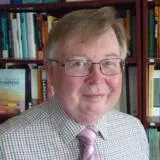
Biography
Before joining King’s as a Visiting Lecturer in 2008, Dr Martin Edwardes had been working for over 20 years in industry as a Systems Consultant, a career he finished in 2002 to begin work on his PhD.
In 2006 Martin became the Communications Liaison at the City of London Academy Bermondsey, a role he continued in until 2011. He officially retired in 2018, but continues to teach as a KCL Visiting Lecturer on a range of modules which are part of the BA English Language and Linguistics degree.
Since 2002 Martin has been producing a weekly bulletin, The Evolutionary Anthropology Online Research Cluster Newsletter, listing papers of relevance to the study of human origins.
He is a fellow of the Royal Anthropological Institute. His first book, published in 2010, was The Origins of Grammar: An anthropological perspective (Continuum). Martin's second book, The Origins of Selfhood: An anthropological perspective, was published by UCL Press in May 2019.
Research
Martin's first research interest is language origins. He is interested in the social and cultural aspects of language, so his approach to language origins is anthropological and psychological. In particular, he is looking at the role of self in language: where it comes from, how selfhood defines our relationship with language, and how our language defines selfhood. He supervises the third-year module, Origins of Language.
Martin's second research interest is artificial languages, also known as art languages or constructed languages. He was involved in the production of Night School on Anarres, one of the projects in the KCL presentation, Utopia 2016. The project and the resulting conlangs, tvo-Pravic and Pravlish, can be viewed on his website. Martin also supervises the second-year module, Language Construction.
He also has an interest in neurolinguistics, how the brain creates and uses language. Martin does not actively research in this area, but likes to keep up-to-date with the research of others.
